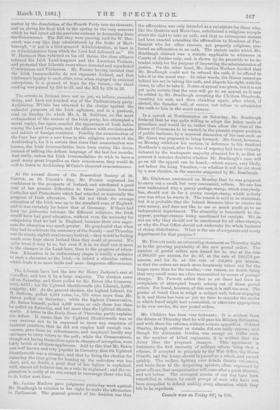Mr. Justice Mathew gave judgment yesterday week against Mr. Bradlaugh
in relation to his right to make the affirmation in Parliament. The general ground of his decision was that
the affirmation was only intended as a substitute for those who, like the Quakers and Moravians, entertained a religious scruple about the right to take an oath, and that no subsequent statute had been enacted extending the affirmation to Members of Par- liament who for other reasons, not properly religious, pre- ferred an affirmation to an oath. The statute under which Mr. Bradlaugh claimed was a statute applicable to witnesses in Courts of Justice only, and is shown by its preamble to be in- tended solely for the purpose of improving the administration of justice. On the other hand, Mr. Justice Mathew decided that Mr. Bradlaugh could not be refused the oath, if he offered to take it in the usual way. In other words, the House cannot go behind his act iu taking the oath, and dispute his right, with his views, to offer to take it. Notice of appeal was given, but it is not yet quite certain that the case will go to an appeal, as it may be settled by Mr. Bradlaugh accepting the Chiltern Hundreds, vacating his seat, and then standing again, after which, if elected, the Speaker will, of course, not refuse to administer the oath to him in the usual manner.


































 Previous page
Previous page